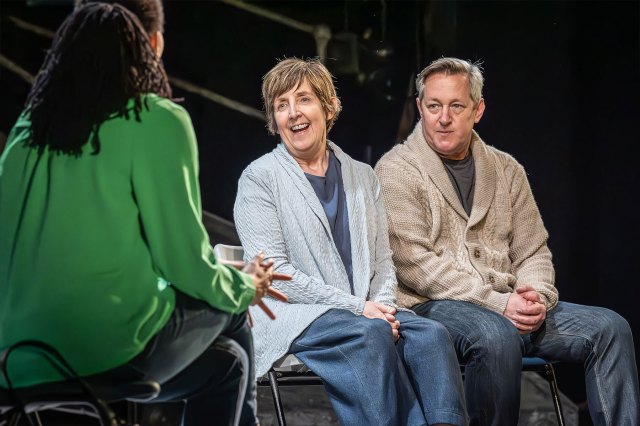Punch at Nottingham Playhouse review – James Graham’s new drama is gutwrenching but humorous
The world premiere production runs until 25 May

Jacob Dunne was a wayward youngster from a single-parent family, living on a council estate in Nottingham. Struggling at school, with zero prospects and needing to prove his worth to his peers, he drifted into drinking, drugs and fighting for fun. Then, a fateful fight one night changed the course of his life.
In 2011, Dunne threw a single punch that ended another man’s, James Hodgkinson’s, life. Sentenced for manslaughter, he served 14 months in prison. On his release, he found himself with nowhere to live, no job and struggling to find a sense of worth and purpose. Wracked with anger, fear and guilt, the option was there to turn back to his old ways, but, with the help of others, and with the encouragement of his victim’s parents, he managed to turn things around and discover his true potential.
Based on the book Right from Wrong by Dunne himself and adapted by multiple Olivier Award-winning playwright James Graham, Punch is an absolute powerhouse of a production. It forces you to interrogate ideas of punishment, the futility of prison, and to ultimately conclude that there is an absolute need for restorative justice as a prominent part of our judiciary system. What unfolds is a moving and compelling retelling of a remarkable journey, where a split-second, mindless decision becomes a defining moment for two men and their families. Ending one man’s life, and, in essence giving purpose and meaning to the other.
Grahams’ skill at lightening such a harrowing topic is brilliant. The play is peppered liberally with fantastic humour, which hits the mark every time. His nods to Nottingham in his writing were well appreciated by the local audience. His language, at times, is coarse and guttural to reflect the slang of the streets, but at others, it is majestic and lyrical. Rhyming, poetic and hypnotic. Coupled with movement director Leanne Pinder’s dance sequences and parkour-like leaps, there are moments of pure dynamism.
Sound designer and composer Alexandra Faye Braithwaite’s music and sound and Robbie Butler’s lighting take us from a club to a church to a dark alley in an instant. They also immediately transport us from the past to the present with the same character by the flick of a spotlight, the use of silence or a slick song change.
Adam Penford’s direction fully utilises the predominantly static stage, seeing most of the actors on view at the same time, performing peripheral roles or changing additional set pieces fluidly. Anna Fleischle’s set design, employing a semi-circular, two-tier, grey stone/metal structure, is impressive. It is used to represent an industrial walkway, boy’s bedroom, prison, club, hospital, and an estate, among many other settings.
The cast of six as a whole are incredible. Playing multiple roles, they blend into them seamlessly, within the blink of an eye. David Shields plays Jacob with aplomb. Navigating a whole gambit of energies and emotions he has us gripped. Shields embodies the role with varying degrees of vulnerability and bravado, switching from past Jacob to present Jacob, he is astonishing. Julie Hesmondhalgh is breathtaking as James’ mother Joan. She plays her with an understated empathy, a grounded goodness that permeates throughout the production and lifts all the hurt with hope. Her moment towards the end where she talks about James is handled with such respect and sensitivity. It is almost too much to bear but is a sort of lynchpin of the piece.

Tony Hirst portrays David, James’ father with a superb mixture of raw, visceral hurt, simmering anger and an internal conflict between loss and forgiveness. Balancing these whilst trying to maintain his composure, move forward and honouring his son’s memory is heartbreaking to witness. His embodiment of additional characters is brilliant. Shalisha James-Davis, Emma Pallant and Alec Boaden are fabulous playing a multitude of characters. Slipping in and out of emotions, accents, ages, facial expressions, sometimes with just the addition of a jacket or the tying up of hair is like watching skillful sorcery.
Punch is provocative. It’s gut-wrenching, hard-hitting and, at times, really funny. It sensitively tackles tough subjects such as manslaughter, social reform, misplaced political priorities, the failings in our probation/prison system, toxic masculinity, poverty, fear, shame, guilt, pain, and our lack of societal compassion. It’s beautifully written and wonderfully handled. The standing ovation and rapturous applause at the end of the performance I attended spoke for itself. This is an important piece of theatre, and it needs to be seen.
















